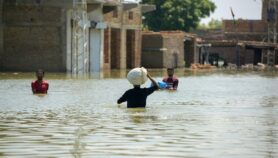By: Tom Clarke
Send to a friend
The details you provide on this page will not be used to send unsolicited email, and will not be sold to a 3rd party. See privacy policy.
In a predominately rural country in which agriculture and freshwater fishing are the linchpins of the economy, Bangladesh’s rivers are the people’s lifeblood. But these blessings, allied with the region’s monsoon climate are also a curse.
For much of the year, the vast delta formed by Bangladesh’s great rivers is parched, but with the summer monsoons their banks often burst, leading to a devastating cycle of flooding and drought.
In this article, Tom Clarke explains how some water-management efforts have only exacerbated the problems — for example, the sinking of wells in the 1970s has resulted in widespread arsenic poisoning. He also describes what Bangladeshi scientists are doing today to overcome these problems, and reports that in some cases political factors may be the main stumbling block for progress.
Link to Nature feature article
Source: Nature 422, 254 (2003)
Related articles:
How to slake a planet’s thirst, 20 March 2003
Asia’s arsenic crisis deepens, 17 February 2003
Tainted wells pose food threat in Bangladesh, 6 December 2002
Scientists clean up arsenic with GM plants, 11 October 2002
Bangladeshis to sue over arsenic poisoning, 12 October 2001 
Homepage













